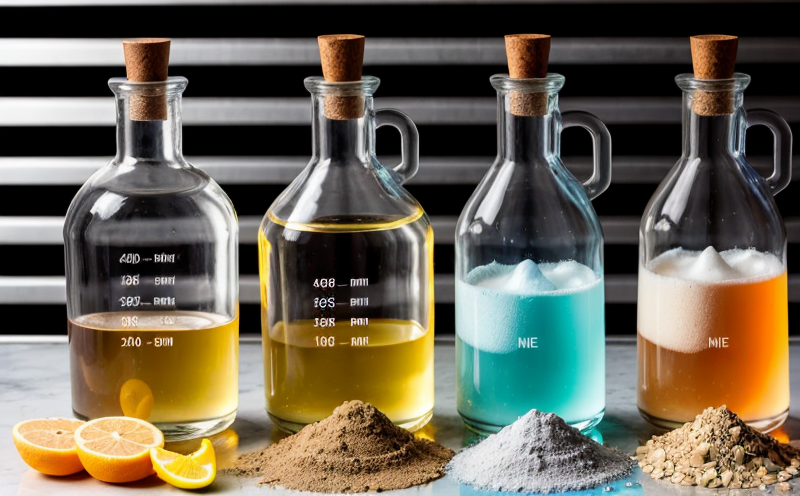ASTM F3148 Electrolyte Safety Testing of Rechargeable Lithium Cells
The ASTM F3148 standard provides a comprehensive framework for the safety testing of electrolytes used in rechargeable lithium cells. This service ensures that the electrolyte is stable and safe under various stress conditions, which are critical to prevent potential hazards during manufacturing, storage, and use.
The test involves subjecting the electrolyte to multiple scenarios designed to mimic real-world conditions that could lead to thermal runaway or other hazardous reactions. These tests include overcharge, overdischarge, short circuit, and heat abuse. The primary goal is to ensure that the electrolyte maintains its integrity and does not degrade into a state where it may cause an explosion or fire.
During the testing process, we use specialized equipment to monitor temperature, pressure, and other parameters in real-time. Our laboratory ensures that all tests are conducted in accordance with ASTM F3148 guidelines, which include the use of specific test cells and reference materials. The results of these tests provide critical insights into the performance and safety of electrolytes used in various applications.
One of the key aspects of this service is the ability to customize the testing protocol based on client requirements. This flexibility allows us to tailor the testing process to meet specific industry standards or internal quality control measures. By doing so, we ensure that our clients receive results that are both accurate and relevant to their unique needs.
The ASTM F3148 standard is widely recognized in the battery manufacturing industry as a benchmark for electrolyte safety testing. Compliance with this standard not only enhances product safety but also supports regulatory compliance and market access. Our laboratory adheres strictly to the ASTM F3148 guidelines, ensuring that all tests are conducted under controlled conditions and that accurate results are delivered promptly.
The testing process begins with the receipt of the electrolyte sample from the client. Once received, our team prepares the sample according to the specified ASTM F3148 protocol. This includes ensuring the sample is in a suitable state for testing and preparing any necessary reference materials. The next step involves setting up the test cell and initiating the test sequence.
Throughout the testing process, we use advanced instrumentation to monitor key parameters such as temperature, pressure, voltage, and current. These instruments provide real-time data that is critical for ensuring accurate and reliable results. Once the tests are complete, our team analyzes the data and prepares a comprehensive report detailing the test results.
The report includes detailed information on the performance of the electrolyte under various stress conditions, including any deviations from expected behavior. This information is invaluable to clients looking to improve product design or identify potential areas for improvement. Our laboratory also provides recommendations based on the test results, helping clients make informed decisions about their manufacturing processes.
In addition to ASTM F3148 testing, we offer a range of other services related to battery testing and quality assurance. These include capacity testing, impedance analysis, and thermal cycling tests. Our comprehensive approach ensures that our clients receive a holistic view of the performance characteristics of their products.
Industry Applications
| Application | Description |
|---|---|
| Electric Vehicles (EVs) | The electrolyte in EV batteries must be safe and stable under extreme conditions. ASTM F3148 testing ensures that the electrolytes used in EV batteries meet stringent safety standards. |
| Portable Electronics | The electrolytes used in portable electronics such as smartphones, tablets, and laptops must be safe and reliable. ASTM F3148 testing helps ensure that the electrolytes are suitable for these applications. |
| Medical Devices | Batteries used in medical devices require high levels of safety to prevent accidents or malfunctions. ASTM F3148 testing ensures that the electrolytes used in these batteries meet strict safety standards. |
| Aerospace and Defense | The aerospace and defense industries demand highly reliable battery technology for their critical applications. ASTM F3148 testing helps ensure that the electrolytes used in these batteries are safe and dependable. |
- Ensures compliance with international standards
- Provides insights into product performance under stress conditions
- Aids in identifying potential safety hazards early on
- Supports continuous improvement of battery design and manufacturing processes
Eurolab Advantages
Our laboratory offers a range of advantages that make us the premier choice for ASTM F3148 electrolyte safety testing. Our team of experts has extensive experience in battery testing and quality assurance, ensuring that our clients receive accurate and reliable results.
We invest heavily in state-of-the-art equipment to ensure that our tests are conducted under the most precise conditions possible. This allows us to deliver results that are both accurate and relevant to our clients' unique needs. Our laboratory also adheres strictly to ASTM F3148 guidelines, ensuring that all tests are conducted in a standardized manner.
We understand that time is of the essence for many of our clients, which is why we offer fast turnaround times on our testing services. This allows our clients to receive their results quickly and make informed decisions about their manufacturing processes.
Our laboratory also provides comprehensive reporting services, ensuring that our clients have all the information they need to understand the performance characteristics of their products. Our reports are detailed and easy to interpret, making them invaluable tools for decision-making.
Quality and Reliability Assurance
- Compliance with ASTM F3148 standards
- Detailed monitoring of key parameters such as temperature, pressure, voltage, and current
- Use of advanced instrumentation for accurate data collection
- Customizable testing protocols to meet client requirements
- Preparation of the electrolyte sample according to ASTM F3148 guidelines
- Setting up the test cell and initiating the test sequence
- Real-time monitoring of key parameters during testing
- Data analysis and preparation of comprehensive reports





